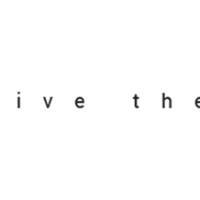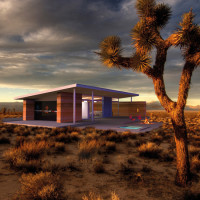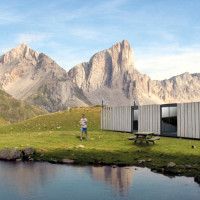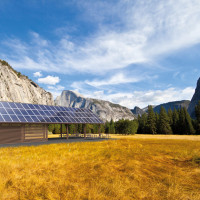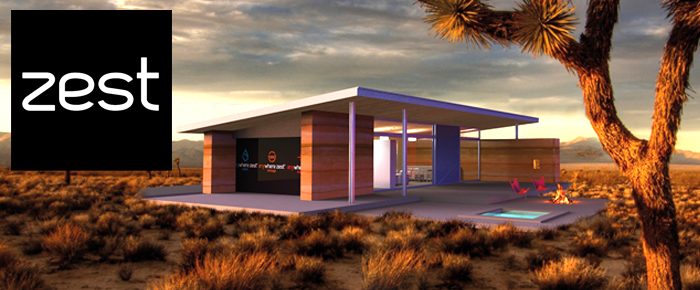
By Heidi Simmons
Our word Liberty comes from the French. For Americans, the significance of its meaning is paramount. Freedom from oppressive restrictions imposed by authority on our way of life, behavior or political views is no small matter.
The French not only share our passion for freedom, but also understand its fundamental importance as a way of life.
Last week, the French start-up company Anywhere Zest, shared a product and a vision for a lifestyle off the grid with their adaptable, self-contained, modular structure which can be plunked down just about anywhere in the world.
“It’s about self-sufficiency and resilience,” said Karim Bensiam, Zest’s Deputy CEO of International Business Development. Bensiam spoke English with the charm of a thick French accent. “Zest is one idea, one platform and one solution.”
Each Zest unit is 1,000 square feet and can be customized with separate energy, water and waste systems. Calling the modern space Anywhere Zest, the structure can be situated in the middle of nowhere or on top of an existing skyscraper. It can serve as living or office space. Placing Zest units together can form remote hospitals, clinics, schools and even innovative, sustainable communities.
“We are here to share design, technology and ideas,” said Bensiam.
With the valley’s sunny environment and open space, Zest homes are a perfect match for sustainable and cost effective living. A complete single unit system is priced at $60,000.
But beyond the mobile, self-contained, green, modern home is the dynamic technology that can be customized to the environment.
Zest systems require no existing infrastructure, which is a huge expense in building. The day-to-day living requirements of a home, like electricity, running water and sewage are compact self-sustaining modules.
Zest’s energy system harnesses solar and wind technology, which is collected and stored in batteries. The water system extracts moister from the air producing 12 to 15 liters a day. Also, if there is a nearby well, lake or if it rains, the multi-filtering water system provides additional potable water. The sewage system uses a small-scale phyto-purification and methanisation that provides environmentally friendly waste recycling. It also produces garden quality compost.
These Zest modules can be linked together. They can also form a grid. With Zest Connect, a wireless network can be created. Zest’s “Smart Solutions” allows the modules to communicate with other Zest systems so resources can be shared, conserved or distributed where they are most needed.
Even a Zest garden is available with water coming from a recuperation system fed by the treated sewage. The Zest living possibilities are up to one’s imagination. It is an extreme example of what eco-friendly development is capable of creating.
Zest has had its eye on the California desert for a while. Teaming up with Desert Lightning, a business incubator in Desert Hot Springs, Zest hopes to create new partnerships with local companies.
“I’m proud that Desert Hot Springs is showing innovation and leadership by hosting this company from halfway around the world,” said Steven Slomkowski, Director of Business Development, Desert Lightning. “Zest’s potential and the possibilities are very exciting.” Slomkowski and Desert Lightning are representing Zest here in the United States.
Zest’s parent company is Groupe Brunet, a full service construction outfit established in 1964 with headquarters in Léon, France. Currently, the family owned business is in 10 countries with 415 employees and annual revenue of $55 million.
Groupe Brunet President, Jean-Pierre Brunet, was on hand at the presentation, helping with language translation and questions.
Brunet shared that he wanted to imagine something different and to find better solutions to typical construction. So he put together a team that included Bensiam, who is a civil engineer and the Zest CEO. They then brought on Jean-Christian Cheze, the architect of the modular structure.
“We wanted to find a new way of thinking,” said Bensiam. “How do you satisfy basic human needs? We have less water, less energy, less oil. We asked, how to make it free, self–sufficient and different? We wanted to provide all the needs to the house.”
Modular homes are not a new concept and have been around for over a century. In 1908, Sears Roebuck & Company sold kit homes through their catalog.
Cheze has visited the CV several times and is a big fan of Albert Frey. As an architect, Cheze has long admired the mid-century modern homes in Palm Springs.
“Although it is a different time and different world, it is similar to when the mid-century architects came in with something new. They saw a different way of life,” said Cheze. “Today we must consider the environment and self-sustainability. When I was designing the Zest home, I was thinking how perfect this could be in the Coachella Valley.”
Cheze wants to share Zest with his colleagues so that they can use their imagination and invent new ideas around the modular home and systems.
“It doesn’t have to only be in rural, beautiful landscapes,” said Cheze about the Anywhere Zest structures. “There can be many different approaches. They can build developments where infrastructure already exists. Or build sustainable cities without any infrastructure.”
Zest’s motto is “Live the future.”
This week through December 11, Zest will be one of the presenters at the Sustainable Innovation Forum 2015 in Paris, France. An attending California delegation includes local representatives Congressman Ruiz and Assemblyman Garcia among others.
With the changing nature of electricity delivery and the new rules for water consumption, utility companies are forced to impose guidelines on how we use resources in our home. Good or bad, it is changing how we live.
The Zest system may be the answer not only for those who are uncomfortable with the encroachment on our freedom, but also for those who long for the independence of living off the grid.
The Coachella Valley may be the perfect place to start simplifying life while making it more efficient.
For more information and to “live the future” go to www.anywhere-zest.com (it’s in French). Or see the video at vimeo.com/146349024


































